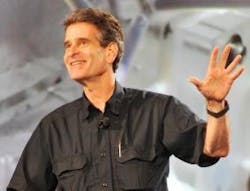“I’m here because this is Geek Central,” Kamen told attendees of his keynote presentation at Rockwell Automation TechED this week in Orlando. “I have to use my time carefully, but this was a no-brainer. Rockwell Automation has been an incredible supporter of FIRST, and you are thousands of techies.
“We need more technologists and a louder voice in the culture, and FIRST helps,” Kamen said. “Today, technology is moving faster, but society and regulation is, if anything, slowing down. The rate of adoption is slowing down. That’s partly because the technical community has not had enough voice.”
Kamen described technological breakthroughs including the Crown stent, which eliminated 100,000 open-heart surgeries in its first year; the wearable insulin pump, which took one year to invent but 15 years to be accepted; and the peritoneal dialysis machine. “Instead of three sessions a week of hell at the hospital, our peritoneal dialysis system works at home, overnight, using a disposable cassette,” he said. “We’ve recently shipped our 600 millionth cassette, but it’s life support – you need to be a pretty sophisticated person to be willing to use it. The new version is Cloud-connected so doctors and family members can monitor and know what’s going on.”
“I’m here because this is Geek Central.” Inventor Dean Kamen spoke to attendees of his keynote presentation at Rockwell Automation TechED this week in Orlando.
Kamen said similar breakthroughs will be more common and more rapidly accepted when we can popularize science, technology, engineering and math (STEM). “FIRST is not another curriculum or another science fair,” he said. It’s intended to inspire by recognition and celebration. “In any free country, you get what you celebrate. We bring the same recognition as people who sing or bounce a ball.”The difference between science and science fiction is timing.
For example, the iBOT mobility system – a Segway-inspired device that allows disabled people to access regular spaces and climb stairs – is life-changing, but the wheelchair manufacturers wouldn’t touch it. “Now we’ve partnered with Toyota to redesign and relaunch it. Like the self-driving car, it’s a science fiction project that’s now available science.”
In the Civil War, soldiers who lost an arm were given a wooden stick with a hook on it. “For Iraq, the wooden stick was replaced by plastic, but IEDs often take off both arms,” Kamen said. “So we invented the DARPA mind-controlled prosthetic arm, which is critically important to a small group of people.
“But the number one cause of death of people less than five years old is contaminated water. So we invented the Slingshot water purification system, which uses distillation with 98% energy recovery. It’s a box with two hoses: you connect one to something wet, which can be salty, sewage or polluted with chemicals, and out the other hose comes water that meets FDA standards.”
Help change the world. Seriously.
How do you make life- and world-changing technology more common and accepted? “Kids will get good at anything grownups make them think is important,” Kamen said. “We founded FIRST 26 years ago, using the sports model. LeBron James is not a phys ed teacher, he is a role model. So we find tech superstars – you – to inspire kids.”
FIRST now has 46,000 teams in 86 countries participating in a “Super Bowl of Smarts,” Kamen said. “And every kid on our teams can turn pro – there’s a job for every one. In 10 or 15 or 20 years, one will cure Alzheimer’s disease or cancer, or build an engine that doesn’t pollute.”
Team members are 30% women and minorities, 50% more likely to attend college, and twice as likely to become engineers. The competition awards $30 million in scholarships.
“The top technical universities fight to get our kids, and now the military is looking for them. No matter what equipment we have, if we don’t have the brightest kids, we can’t defend our country,” Kamen said.
FIRST used to be found at USFirst.org. This year, recognizing the global scale, it’s become FIRSTInspires.org.
“Instead of waiting for more than 86 countries to bubble up, we’ve started the FIRST International organization to spread the word,” Kamen said. “Politics divides countries, science unites the world. Maybe instead of teaching history, we can teach kids everywhere the common language of STEM and let them work together to solve the world’s problems.”
The FIRST competition is not just about the robots. It’s a lesson in humility, hard work and collaboration; a roadmap to engineering; a rock to smash the glass ceilings; a sledgehammer to break cultural barriers; a compass to peace; and a Rosetta stone to translate the future.
It’s not just a robot, it’s a machine to build the people who will change the world.
“The technical community gets an A+ for abilities and effects, but only a C for community,” Kamen said. “FIRST participants say you always get more out of it than you put into it. By becoming a FIRST mentor, you can be part of a global network that, for the first time in history, will allow people to work together and fix the world.”




